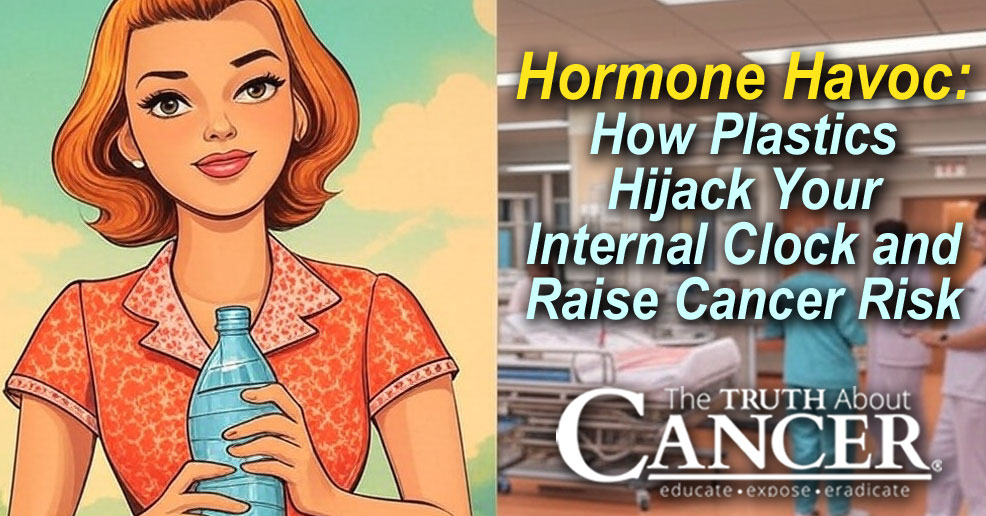We hate to say “we told you so”…
We have been warning people for years that toxic chemicals in plastics, food containers, cleaning products, and even your shampoo are not just gross—they’re hormone-wrecking cancer grenades. And guess what? The science is finally catching up.
Let’s connect the dots, shall we?
Plastics: The Modern Trojan Horse
A new study published in Environmental International found that plastic-derived chemicals don’t just sit around like innocent bystanders—they mess with your circadian rhythm, aka your body’s natural sleep/wake/hormone cycle.
Your body runs on a 24-hour internal clock — your circadian rhythm — which regulates sleep, metabolism, immune defense, cell repair, and more. It syncs up with natural signals like daylight and oxygen levels. But it’s also vulnerable to sabotage. Disrupting the circadian rhythm is like cutting the wires on your body’s internal security system. Once your hormones get confused, your metabolism tanks, your immune system snoozes, and that’s when the big “C” can show up to the party uninvited.
The Endocrine System: Hijacked by Big Chemical
Here’s the short version: your endocrine system runs the show when it comes to hormones. These hormones regulate everything from your mood and weight to fertility and—drumroll—cell growth and tumor suppression.
Now enter the villain: Endocrine-Disrupting Chemicals (EDCs). These are synthetic nasties like phthalates, BPA, parabens, and PFAS (“forever chemicals” that stick around like bad in-laws). They mimic or block hormones, and they’ve been linked to breast cancer, prostate cancer, thyroid dysfunction, and more.
One of the most infamous examples is Diethylstilbestrol (DES)—a synthetic estrogen that doctors prescribed from 1938 to 1971, believing it would prevent miscarriages and promote healthy pregnancies. Spoiler: it didn’t. In fact, decades of research revealed that daughters of women who took DES faced significantly higher risks of rare vaginal and cervical cancers. And here’s the kicker—up to 10 million American women were given this drug before the FDA finally pulled the plug.
Two more examples are PVC and PUR. They sound like harmless acronyms, right? But these plastics are everywhere — quietly embedded in your daily life, from your kitchen to your office to your child’s classroom. PVC (polyvinyl chloride) shows up in food packaging like clear plastic trays, shrink wraps (especially on meats and produce), and blister packs — yep, even the ones your chewing gum comes in. PUR (polyurethane) hides in multilayer snack pouches, foil-lined food wrappers, and even those soft foam inserts that protect fancy chocolates.
Convenient? Sure. Harmless? Not even close.
As mentioned above, our bodies have a circadian rhythm, which is our internal clock. Disrupt that rhythm, and you’re suddenly more prone to diabetes, cancer, and heart disease. And guess what’s doing the disrupting?
Plastics.
Scientists have known this for years. But it’s taken decades for the mainstream to admit what we’ve been warning about all along: the stuff wrapping your food may be messing with your hormones, your sleep, your metabolism — and even your long-term cancer risk.
How to Not Be a Guinea Pig
The NRDC (not exactly a fringe group) gives some basic survival tips to reduce your exposure to hormone-destroying toxins.
Let us break it down:
- Avoid plastic whenever possible. Especially #3, #6, and #7 plastics—they’re the sketchiest of the bunch.
- Don’t microwave your food in plastic containers. That smell isn’t just your leftovers… it’s chemical off-gassing.
- Read your labels. “Fragrance” is often code for “chemical cocktail.”
- Go organic. Pesticides? Another group of EDCs they conveniently forgot to mention in your cereal commercial.
- Skip the receipts. Yes, really. That thermal paper? Laced with BPA.
- Filter your water. Because “municipal treatment” doesn’t catch everything.
The Bottom Line: They Knew. We Knew. Now You Know.
This isn’t paranoia—it’s pattern recognition. Endocrine disruptors have been quietly poisoning us for decades while the regulators, advertisers, and chemical companies looked the other way. Now, with cancer rates soaring and fertility falling, we’re finally allowed to whisper what we’ve been screaming all along.
But whispering isn’t our thing. 😊
So here’s us, shouting it again: clean up your life. Swap the plastics. Read the labels. Protect your hormones like your life depends on it—because it does.



















Where can I find a LIST OF PRODUCTS THAT DON’T CONTAIN THESE FOREVER CHEMICALS????